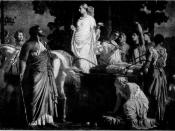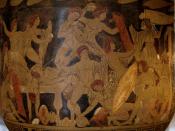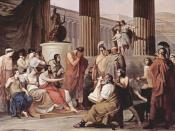Princeton's Wordnet defines hospitality as "[the act of] cordial reception: [or] kindness in welcoming guests or strangers." Since the start of this semester, we have read about two different journeys in which hospitality plays an important role in fulfilling the destiny of the main character. In Homer's Odyssey, many examples of this are apparent, whether they are for the benefit or the downfall of the protagonist Odysseus. However, Odysseus is not the only one whom hospitality rules. His son Telemachus also is affected by his hospitality towards others. In Niane's Sundiata: An Epic of Old Mali, the theme of hospitality runs thick throughout the narrative, as Sundiata is greatly affected by how the other characters receive him. If it were not for the hospitable acts shown to both of the weary travelers, Odysseus and Sundiata may not have been able to return to their homeland.
The extreme observance of hospitality in the two texts may be compared with the golden rule: treat others, as you would like to be treated.
The rule of hospitality may also be applied to the gods. In the time of Odysseus, gods or deities could take the form of humans or alter human appearance. If a stranger showed up at your door, you might not know whether they are mortal or immortal. If you turned away a god or someone loved by the gods, this could anger them and in turn they could avenge your inhospitable act. The gods might respond with not giving you a good harvest or make your life a complete hell, as Poseidon did to the journey of Odysseus.
Good hospitality was to be displayed towards everyone, no matter age or gender. In The Odyssey, not only was Odysseus treated well by the lords of the lands he visited, but,


